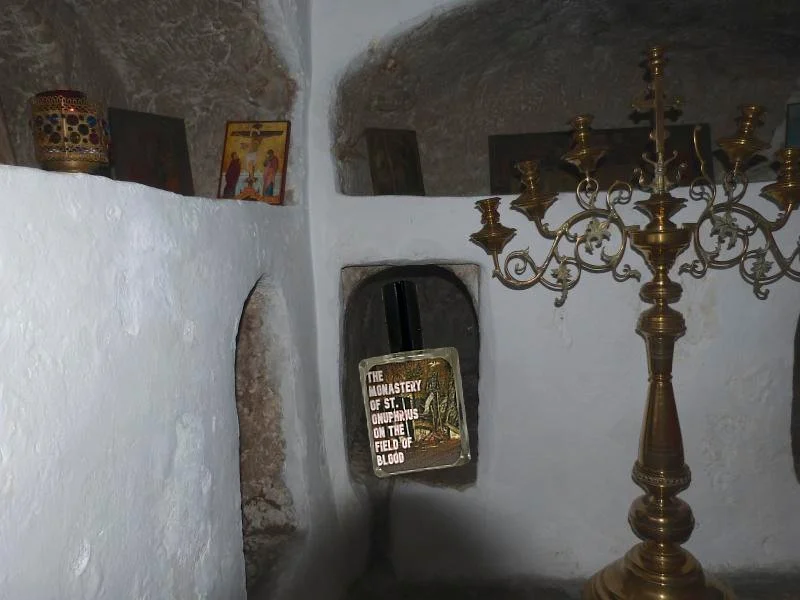
The Monastery of St. Onuphrius on the Field of Blood
A 4th-century Egyptian desert hermit, Onuphrius is remembered as one of the most radical exemplars of spiritual withdrawal. Living alone in the Theban desert, clad only in his own hair and leaves, he renounced all worldly ties in pursuit of divine union. The Monastery is established on the site where St. Onuphrius would sit in prayer, and is located in the Akeldama or Potter's Field purchased with the thirty pieces of silver paid to Judas Iscariot for betraying the Lord of All.
This new Extrait de Parfum attempts to represent this beautiful place in the desert where faith smells not of flowers but of blood on flagstones, sun-split balsams, fermented leather, and the sweat of monks who haven’t spoken for years.
Here, leather does not shout. It echoes. Slowly, deeply, from walls that have absorbed centuries of stillness. This is not the leathery flash of modern showpieces — this is worn saddle, monastic belt, parchment and prayer stool. This is leather matured in silence.
The journey begins with Gurjun Balsam, flowing like warm oil along ancient stone corridors. Its dark, balsamic tone anchors the soul before the first bell has tolled. Cedarwood follows — crisp, dry, and luminous — like doors opening to the early morning sun against cold stone.
Then, the deeper movement begins.
A thread of Thai Oud rises — earthy, grounded, meditative. A presence more than a note. This oud doesn’t dominate; it enfolds, echoing the humility of aged wood and forest earth dampened with time. Nagarmotha adds a smoky, root-lit hushed turn of a page. Ambrette diffuses a breath of clean, musky softness — a human warmth, subtle and intimate.
At the core of the composition lies Guaiacwood, soft and embered; Castoreum Absolute, rich and resinous like antique varnish; Civet, used in delicate trace to give depth and body. These are not “animalic” in the loud, showy sense — rather, they are grounding, corporeal, the scent of a world shaped by human hands and natural time.
The foundation is an aged Mysore Sandalwood sitting beside White Ambergris, imparting a sense of air and distance — a kind of olfactory contemplation. Hay lends a golden softness, while Green Hojari Frankincense — a true liturgical-grade resin — lifts the entire structure with its citrus-toned clarity. Beeswax seals it all with warm luminosity, like light filtered through waxed windows at dusk.
This is a fragrance that does not seek to impress. It invites reflection.
The Monastery of St. Onuphrius is a perfume of discipline, of patience, of materials allowed to speak for themselves. For those who understand that depth is not made of volume — it is shaped by time, devotion, and restraint.
A 4th-century Egyptian desert hermit, Onuphrius is remembered as one of the most radical exemplars of spiritual withdrawal. Living alone in the Theban desert, clad only in his own hair and leaves, he renounced all worldly ties in pursuit of divine union. The Monastery is established on the site where St. Onuphrius would sit in prayer, and is located in the Akeldama or Potter's Field purchased with the thirty pieces of silver paid to Judas Iscariot for betraying the Lord of All.
This new Extrait de Parfum attempts to represent this beautiful place in the desert where faith smells not of flowers but of blood on flagstones, sun-split balsams, fermented leather, and the sweat of monks who haven’t spoken for years.
Here, leather does not shout. It echoes. Slowly, deeply, from walls that have absorbed centuries of stillness. This is not the leathery flash of modern showpieces — this is worn saddle, monastic belt, parchment and prayer stool. This is leather matured in silence.
The journey begins with Gurjun Balsam, flowing like warm oil along ancient stone corridors. Its dark, balsamic tone anchors the soul before the first bell has tolled. Cedarwood follows — crisp, dry, and luminous — like doors opening to the early morning sun against cold stone.
Then, the deeper movement begins.
A thread of Thai Oud rises — earthy, grounded, meditative. A presence more than a note. This oud doesn’t dominate; it enfolds, echoing the humility of aged wood and forest earth dampened with time. Nagarmotha adds a smoky, root-lit hushed turn of a page. Ambrette diffuses a breath of clean, musky softness — a human warmth, subtle and intimate.
At the core of the composition lies Guaiacwood, soft and embered; Castoreum Absolute, rich and resinous like antique varnish; Civet, used in delicate trace to give depth and body. These are not “animalic” in the loud, showy sense — rather, they are grounding, corporeal, the scent of a world shaped by human hands and natural time.
The foundation is an aged Mysore Sandalwood sitting beside White Ambergris, imparting a sense of air and distance — a kind of olfactory contemplation. Hay lends a golden softness, while Green Hojari Frankincense — a true liturgical-grade resin — lifts the entire structure with its citrus-toned clarity. Beeswax seals it all with warm luminosity, like light filtered through waxed windows at dusk.
This is a fragrance that does not seek to impress. It invites reflection.
The Monastery of St. Onuphrius is a perfume of discipline, of patience, of materials allowed to speak for themselves. For those who understand that depth is not made of volume — it is shaped by time, devotion, and restraint.